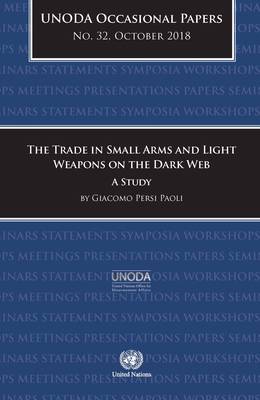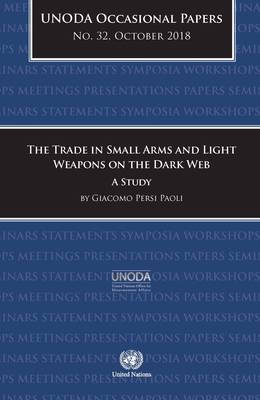
- Afhalen na 1 uur in een winkel met voorraad
- Gratis thuislevering in België vanaf € 30
- Ruim aanbod met 7 miljoen producten
- Afhalen na 1 uur in een winkel met voorraad
- Gratis thuislevering in België vanaf € 30
- Ruim aanbod met 7 miljoen producten
Zoeken
Unoda Occasional Papers No. 32
The Trade in Small Arms and Light Weapons on the Dark Web
Giacomo Persi Paoli, United Nations: Office for Disarmament Affairs
€ 30,45
+ 60 punten
Omschrijving
This document summarizes the main findings and implications of the first empirical study investigating the scale and scope of arms trafficking on the dark web, which was conducted by RAND Europe and the University of Manchester from September 2016 to July 2017. There is an ongoing debate over the extent to which online black markets on the so-called "dark web", the part of the Internet not searchable by traditional search engines and hidden behind anonymity software, facilitate arms trafficking. Details have emerged in the media following the Munich shooting in 2016 linking the weapons used by the attacker to vendors on dark web marketplaces (also known as cryptomarkets). Some media reports have also linked the Paris terrorist attacks in November 2015 to these platforms. While these reports appear to have raised concerns about the role of such dark web markets in arms trade, evidence on the subject is largely anecdotal, based on secondary data as reported after events such as terrorist attacks or successful law enforcement operations.
Specificaties
Betrokkenen
- Auteur(s):
- Uitgeverij:
Inhoud
- Aantal bladzijden:
- 106
- Taal:
- Engels
- Reeks:
Eigenschappen
- Productcode (EAN):
- 9789211303575
- Verschijningsdatum:
- 31/01/2019
- Uitvoering:
- Paperback
- Formaat:
- Trade paperback (VS)
- Afmetingen:
- 142 mm x 215 mm
- Gewicht:
- 136 g

Alleen bij Standaard Boekhandel
+ 60 punten op je klantenkaart van Standaard Boekhandel
Beoordelingen
We publiceren alleen reviews die voldoen aan de voorwaarden voor reviews. Bekijk onze voorwaarden voor reviews.











